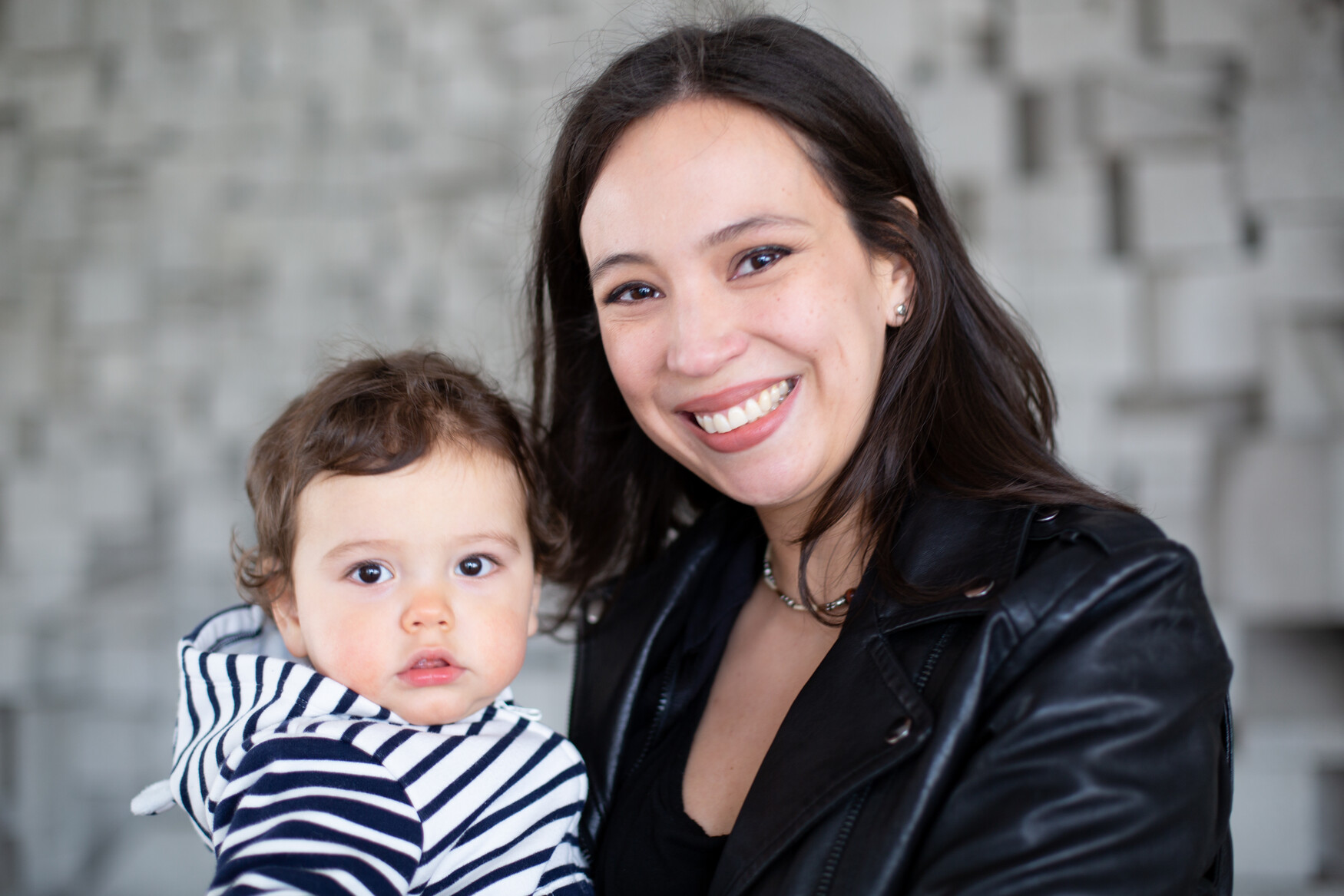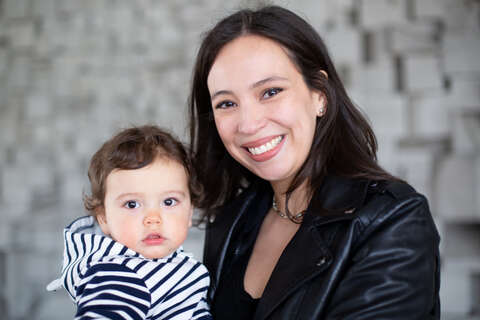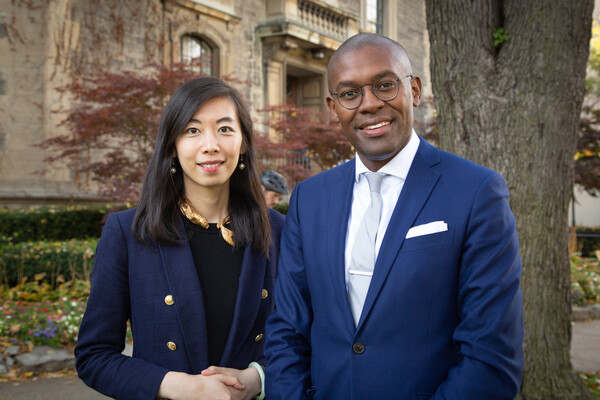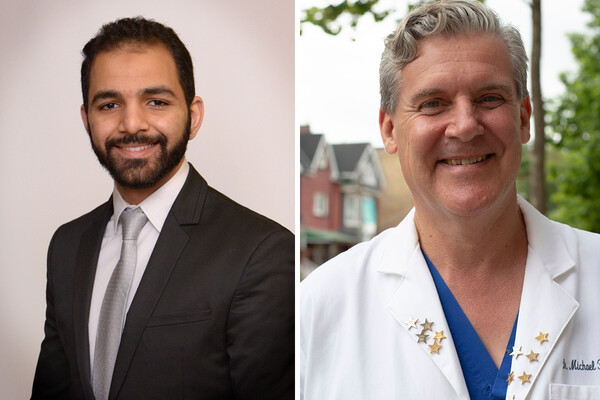Breadcrumbs
- Home
- MD/PhD Program
- News
- Faces of U of T Medicine: Celina Nahanni
Faces of U of T Medicine: Celina Nahanni

Julia Soudat

Celina Nahanni’s original plan was to become a computational researcher, but as she became increasingly interested in the biological sciences and Indigenous activism, she saw medicine as an opportunity to merge the two. While in medical school, Nahanni found her passion in orthopaedic surgery and became a parent. She spoke to writer Julia Soudat about juggling parenthood and medical school, her Indigenous activism and the most valuable lessons she’s learned on her journey.
What did you do before joining UofTMed?
I did my undergrad in physics at the University of Waterloo, then a PhD in Neuroscience at Queen’s University.
What made you want to become a doctor?
I originally wanted to go into medicine to combine my science background with my advocacy work. I liked the idea of applying my analytical skills in a social context that prioritized the human experience.
After having gone through the process, I now understand that there's so much more to being a doctor. It's a dynamic field that is always re-evaluating its own place in society. Physicians wear many different hats and the roles of a doctor are evolving as our understanding of the root causes of disease change. It's such an exciting field and I am so grateful I get to be a part of it!
Can you talk a bit about your Indigenous activism? How do you plan to integrate your activism into your medical career?
Before medical school, I was involved with an organization called Canadian Roots Exchange, a not-for-profit group focused on fostering dialogue and building relationships between Indigenous and non-Indigenous communities. I had the opportunity to travel to several communities in Ontario and learn about their individual challenges and triumphs. When I came to U of T, I worked as the Indigenous Health Officer and worked with an amazing team to put together the Indigenous Health Elective speaker series. I also had the chance to connect with some inspiring, strong Indigenous women in medicine, like Dr. Janet Smylie and Dr. Lisa Richardson.
With regards to weaving activism into my medical career, the story runs deeper. I learned a great deal from my mother, who advocated for Indigenous issues her whole life. I watched her collect stories, record oral traditions and advocate fiercely for her own personhood and the personhood of all Indigenous people. I watched how Indigenous people have to spend a lot of energy and time justifying their existence. They have to explain why they deserve a place to live, clean water, mental health services, and why they should be given a seat at the table when decisions are being made that affect their health and the health of their children.
Unfortunately, as it is for all minorities, Indigenous peoples’ presence in long-standing professional institutions like medicine, is in itself a political act. I feel this applies twofold to me as I recently (and proudly) became a mother - another role not typically associated with medical learners. Therefore, Indigenous existence in this space is in itself activism.
After many years of having conversations about Indigenous issues, I have found that the best and most sustainable way for me to combat systemic bias is by being open about who I am, my abilities and the limits of my knowledge. I am not a perfect person, but I am always striving to be better for my family, my patients, my friends and my peers.
I have been lucky to have been surrounded by wonderfully supportive peers and mentors here a U of T who are open to having this kind of dialogue. And I feel very lucky to have found support from the U of T department of Surgery with regard to not only being an Indigenous woman, but also an Indigenous mother.
Was medical school what you thought it would be when you first started?
Not at all. I had a lot of trouble in my first two years. There was so much memorizing and classwork that I often felt overwhelmed. Coming from an academic background where all I did was analytical problem solving with little to no memorization, it was really hard to shift my approach. Further, the only structured clinical exposure we got in preclerkship was to family medicine, which was very valuable, but didn’t feel like the right fit for me. I was concerned I’d made the wrong choice in coming to medical school but then I got to clerkship and suddenly I felt like I could breathe again. I loved working in the hospital, the high acuity care, moving patients along their care pathways, the collaborative environment and being in the OR. I knew almost right away that I was where I was supposed to be, and I haven’t looked back since.
What have been some of the most exciting projects to work on in the past four years?
I’ve been given the opportunity to work on some amazing projects throughout medical school but by far the most exciting “project” has been raising my amazing son Hunter. I’ve learned so much so quickly, it’s hard to even describe how transformative it is to become a parent. And like all working parents, I’ve had to learn a lot of hard lessons about balancing a demanding career and parenthood. I’ve been incredibly lucky to have a very supportive family and I’m grateful that the U of T administration was encouraging and accommodating when I approached them.
What is the most valuable lesson you learned in medical school?
Medicine is the kind of career that you can really give everything to and it will never be enough. There is an unlimited need in the world for medical services and the definition of medical treatment is always evolving. It’s really important to draw boundaries around your own time and priorities so you can have a sustainable career while balancing the benefit of clinical exposure. I’m not always the best at doing this, but I understand how important it is since having a baby between third and fourth year. I can think of a number of times that I wish I’d stayed later to see an interesting case, and times when I think I should have left earlier to see my family. There aren’t any easy solutions, but it’s really important to set priorities and stay true to yourself.
You’re going on to residency in Orthopaedic Surgery at U of T. What attracted you to orthopaedic surgery? What are you looking forward to most in residency and what are you most nervous about?
Orthopaedics was not in my original plan and I think that’s mostly because I didn’t get exposure to it until clerkship. When I finally did get into some ortho ORs, the environment felt like a good fit for me, both technically and professionally. The fixed coordinate systems of the skeletal structure resonated with my background in physics and reminded me of my mechanics courses (which were some of my favourite classes!). And like many of my surgery peers, I enjoy working with my hands, solving visuospatial problems and providing definitive care. It’s tremendously satisfying to see a problem, come up with a plan and execute it. Especially when the results are as tangible as puzzling broken bones back together.
I was also struck by the culture or Orthopaedics, I had the chance to work with some very skilled surgeons who are leaders in their fields, and they exhibited tremendous humility and honesty, mixed with a healthy sense of humour. This attitude was also inspired in their trainees, who were comfortable expressing their knowledge as well as their knowledge gaps. I found that the residents were appropriately supported in their learning and I wanted to train in that kind of environment.
With regards to what makes me the most nervous, that’s easy. It will be balancing my residency training with spending time with my family. I realized early on that I am a better mother and a better partner to my husband when I am working hard. I enjoy my downtime more and appreciate my loved ones when I feel professionally fulfilled. But there is a fine line between working hard and being absent from your personal life. If you are energized by your career then you will have energy for your loved ones, the trick is then making sure you’re physically with them to give them your time and energy.
Juggling medical school and being a new parent sounds like a challenge, to say the least. What got you through the tough times?
None of it would have been possible without my incredible support network. My partner and I both work, so my parents and in-laws (especially my wonderful mother-in-law) have all stepped in to help with childcare. If it wasn’t for them, I wouldn’t have been able to finish my degree, let alone go into a surgical specialty. I am grateful every day for the loving support and selfless sacrifices made by my family not only in the last year but throughout my life.
What advice would you give to incoming students?
Medical school is not medicine. Though the first two years of your studies are important bridges from the non-medical to the medical world, it is important to keep the end goal in mind, which is to find a job that will make you happy. I would advise incoming students who are unsure of what they want to do, to shadow as much as possible in as many places as possible and find the specialty that energizes them. If I could go back, I would set aside a day a week for shadowing and arrange short observerships outside of Toronto. With the benefit of hindsight, I know that this would have been the highest yield use of my time.
News


